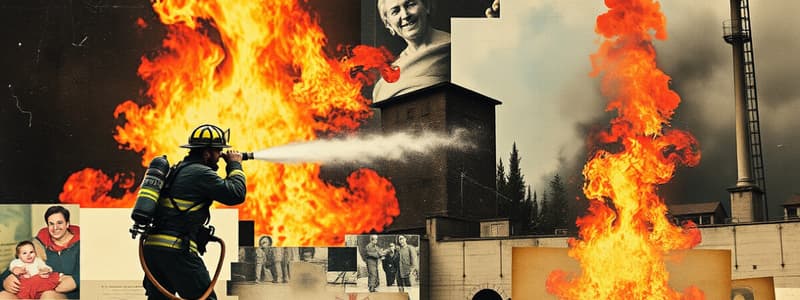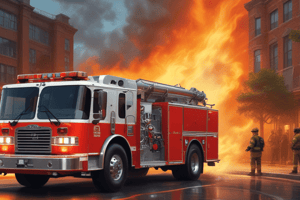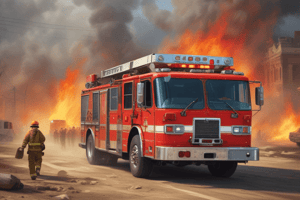Podcast
Questions and Answers
What is the role of the Incident Commander (IC) regarding post incident inspections?
What is the role of the Incident Commander (IC) regarding post incident inspections?
- The IC has no authority over post incident inspection decisions.
- The IC must perform all post incident inspections personally.
- The IC can only schedule inspections after consulting with the fire department.
- The IC is responsible for determining if additional inspections are needed. (correct)
Under what condition can the IC waive post incident inspections?
Under what condition can the IC waive post incident inspections?
- If the owner refuses the inspection.
- If the building is unoccupied.
- If a fire watch is established. (correct)
- If there is no risk of secondary fires.
What is the purpose of dispatching C99 to the incident?
What is the purpose of dispatching C99 to the incident?
- To assess the structural damage to the building.
- To inform the owner about fire watch qualifications and costs. (correct)
- To investigate the initial cause of the fire.
- To conduct a thorough fire code compliance inspection.
When should crews consider creating additional openings in a structure?
When should crews consider creating additional openings in a structure?
What is a key factor to consider during post-incident inspections to prevent secondary fires?
What is a key factor to consider during post-incident inspections to prevent secondary fires?
What is the primary goal of overhaul activities in fire suppression?
What is the primary goal of overhaul activities in fire suppression?
Which tool is NOT commonly used during overhaul operations to locate hidden fires?
Which tool is NOT commonly used during overhaul operations to locate hidden fires?
Which construction feature should be carefully inspected due to its potential role in fire spread?
Which construction feature should be carefully inspected due to its potential role in fire spread?
What considerations should be discussed with the owner/occupant regarding insulation removal?
What considerations should be discussed with the owner/occupant regarding insulation removal?
What is the responsibility of the Incident Commander (IC) after the fire area has been overhauled?
What is the responsibility of the Incident Commander (IC) after the fire area has been overhauled?
Why is it difficult to guarantee complete suppression of all materials during overhaul?
Why is it difficult to guarantee complete suppression of all materials during overhaul?
What specifically poses a risk for secondary fires related to attic spaces?
What specifically poses a risk for secondary fires related to attic spaces?
What should be assessed during walkthrough inspections after an incident?
What should be assessed during walkthrough inspections after an incident?
Study Notes
Fire Suppression Operations
- Small pockets of concealed fires may go undetected during suppression efforts.
- Overhaul activities are crucial for locating and extinguishing hidden fires or "hot spots."
- Suppression crews should maximize the opening of construction voids for thorough examination.
Areas of Concern
- Extensive decomposition in floors, walls, or ceilings indicates areas needing closer inspection.
- Wooden door jambs, air conditioning vents, baseboards, and door/window casings are common hot spots.
- Metal to wood connections, ties, straps, conduits, light fixtures, and electrical outlets must also be checked.
Tools for Detecting Hidden Fires
- Thermal Imaging Cameras (TICs) help locate hot spots, although they may miss small ones.
- Foam applicators, axes, pike poles, and Halligan tools are essential equipment during overhaul.
Special Hazards and Insulation
- Attic fires pose risks of secondary fires due to exposed insulation.
- Significant fire damage may occur in hard-to-access areas, requiring careful insulation removal.
- Complete removal of insulation, especially cellulose, may not be feasible without extensive ceiling removal.
Risk Assessment and Responsibility
- Firefighters should conduct risk/benefit discussions with property owners about insulation removal.
- The incident commander (IC) oversees that thorough overhauls are conducted in fire areas.
- The last company officer on scene is responsible for fire extinguishment efforts.
Post-Incident Inspections
- IC must schedule post-incident inspections to ascertain smoke or hot spots remain in structures.
- Inspections may involve examining areas under salvage covers and possibly creating new openings.
- Fire department units should perform a final inspection before leaving the scene.
Collaboration with Property Owners
- IC is responsible for assessing the necessity of further inspections and coordinating with Dispatch & Deployment.
- Periodic post-incident inspections can help avert secondary fires, particularly in buildings with cellulose insulation.
- IC may waive inspections if a fire watch is established; C99 should be called if warranted.
Documentation and Compliance
- C99 meets with owners to explain Fire Code requirements and qualifications for a fire watch.
- Ensures owner/occupants understand their responsibilities under Fire Code regulations.
Studying That Suits You
Use AI to generate personalized quizzes and flashcards to suit your learning preferences.
Description
This quiz focuses on the critical aspects of detecting and extinguishing hidden fires during fire suppression operations. It covers the importance of thorough overhaul activities and the examination of various construction voids that may conceal fire. Understanding these concepts is essential for effective fire management and safety.




